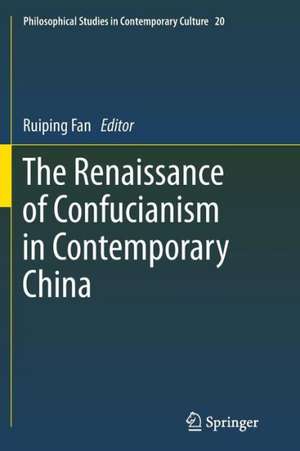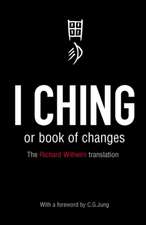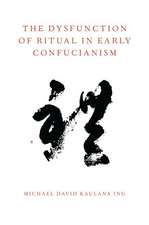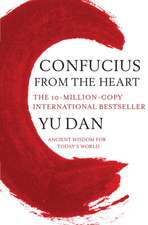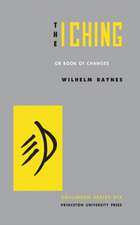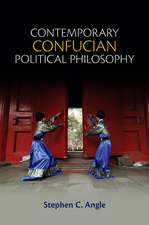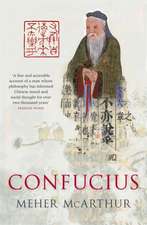The Renaissance of Confucianism in Contemporary China: Philosophical Studies in Contemporary Culture, cartea 20
Editat de Ruiping Fanen Limba Engleză Paperback – 15 iul 2013
| Toate formatele și edițiile | Preț | Express |
|---|---|---|
| Paperback (1) | 558.87 lei 38-44 zile | |
| SPRINGER NETHERLANDS – 15 iul 2013 | 558.87 lei 38-44 zile | |
| Hardback (1) | 644.95 lei 6-8 săpt. | |
| SPRINGER NETHERLANDS – 24 mai 2011 | 644.95 lei 6-8 săpt. |
Din seria Philosophical Studies in Contemporary Culture
- 15%
 Preț: 641.38 lei
Preț: 641.38 lei -
 Preț: 390.08 lei
Preț: 390.08 lei -
 Preț: 383.93 lei
Preț: 383.93 lei - 15%
 Preț: 643.34 lei
Preț: 643.34 lei - 18%
 Preț: 950.96 lei
Preț: 950.96 lei - 15%
 Preț: 640.55 lei
Preț: 640.55 lei - 15%
 Preț: 643.84 lei
Preț: 643.84 lei - 15%
 Preț: 640.55 lei
Preț: 640.55 lei - 15%
 Preț: 634.18 lei
Preț: 634.18 lei - 15%
 Preț: 645.60 lei
Preț: 645.60 lei - 15%
 Preț: 641.03 lei
Preț: 641.03 lei - 15%
 Preț: 647.08 lei
Preț: 647.08 lei -
 Preț: 387.96 lei
Preț: 387.96 lei - 20%
 Preț: 570.73 lei
Preț: 570.73 lei - 15%
 Preț: 589.97 lei
Preț: 589.97 lei -
 Preț: 387.96 lei
Preț: 387.96 lei - 18%
 Preț: 777.50 lei
Preț: 777.50 lei - 15%
 Preț: 703.06 lei
Preț: 703.06 lei - 15%
 Preț: 643.48 lei
Preț: 643.48 lei - 18%
 Preț: 1237.14 lei
Preț: 1237.14 lei - 18%
 Preț: 953.82 lei
Preț: 953.82 lei - 18%
 Preț: 1114.83 lei
Preț: 1114.83 lei - 15%
 Preț: 635.47 lei
Preț: 635.47 lei - 15%
 Preț: 635.65 lei
Preț: 635.65 lei - 15%
 Preț: 642.68 lei
Preț: 642.68 lei
Preț: 558.87 lei
Preț vechi: 698.60 lei
-20% Nou
Puncte Express: 838
Preț estimativ în valută:
106.95€ • 111.25$ • 88.30£
106.95€ • 111.25$ • 88.30£
Carte tipărită la comandă
Livrare economică 08-14 aprilie
Preluare comenzi: 021 569.72.76
Specificații
ISBN-13: 9789400736252
ISBN-10: 9400736258
Pagini: 276
Ilustrații: X, 266 p.
Dimensiuni: 155 x 235 x 14 mm
Greutate: 0.39 kg
Ediția:2011
Editura: SPRINGER NETHERLANDS
Colecția Springer
Seria Philosophical Studies in Contemporary Culture
Locul publicării:Dordrecht, Netherlands
ISBN-10: 9400736258
Pagini: 276
Ilustrații: X, 266 p.
Dimensiuni: 155 x 235 x 14 mm
Greutate: 0.39 kg
Ediția:2011
Editura: SPRINGER NETHERLANDS
Colecția Springer
Seria Philosophical Studies in Contemporary Culture
Locul publicării:Dordrecht, Netherlands
Public țintă
ResearchCuprins
Introduction. The Rise of Authentic Confucianism, Ruiping Fan.-
Part I. The Renaissance of Confucianism.- 1. From Mind Confucianism to Political Confucianism, Jiang Qing.- 2. The Rise of Political Confucianism in Contemporary China, Ruichang Wang.- 3. On “One-Continuity” in Jiang Qing’s Confucian Thought, Dan Lin.- 4. Jiang Qing on Equality, Ruiping Fan.- 5. The Confucian Conception of Transcendence and Filial Piety, Qingxin K. Wang.-
6. Toward a Proper Relation between Men and Women: Beyond Masculinism and Feminism, Tangjia Wang.- 7. The Soft Power in the Confucian “Kingly Way”, Anthony Yeung.-
Part II. Critiques and Responses.- 8. Jiang Qing’s “Political Confucianism” , Daniel Bell.- 9. Declaration towards a Global Ethic? Jiang Qing’s Response, Jonathan Chan.- 10. Jiang Qing on the Inevitable and Permanent Conflict between the Christian Faith and Confucian Culture, Ping-cheung Lo.- 11. The Characteristics and Prospect of Confucian Academies: A Commentary on Jiang Qing's Ideas on Confucian Academies, Xiuping Hong.- 12. Three Political Confucianisms and Half a Century, Albert H.Y. Chen .- 13. Is Political Confucianism a Universalism? An Analysis of Jiang Qing’s Philosophical Tendency, Xianglong Zhang.-
Part III. A Note on Jiang Qing.- 14. A Confucian Coming of Age, Erika Yu and Meng Fan.
Part I. The Renaissance of Confucianism.- 1. From Mind Confucianism to Political Confucianism, Jiang Qing.- 2. The Rise of Political Confucianism in Contemporary China, Ruichang Wang.- 3. On “One-Continuity” in Jiang Qing’s Confucian Thought, Dan Lin.- 4. Jiang Qing on Equality, Ruiping Fan.- 5. The Confucian Conception of Transcendence and Filial Piety, Qingxin K. Wang.-
6. Toward a Proper Relation between Men and Women: Beyond Masculinism and Feminism, Tangjia Wang.- 7. The Soft Power in the Confucian “Kingly Way”, Anthony Yeung.-
Part II. Critiques and Responses.- 8. Jiang Qing’s “Political Confucianism” , Daniel Bell.- 9. Declaration towards a Global Ethic? Jiang Qing’s Response, Jonathan Chan.- 10. Jiang Qing on the Inevitable and Permanent Conflict between the Christian Faith and Confucian Culture, Ping-cheung Lo.- 11. The Characteristics and Prospect of Confucian Academies: A Commentary on Jiang Qing's Ideas on Confucian Academies, Xiuping Hong.- 12. Three Political Confucianisms and Half a Century, Albert H.Y. Chen .- 13. Is Political Confucianism a Universalism? An Analysis of Jiang Qing’s Philosophical Tendency, Xianglong Zhang.-
Part III. A Note on Jiang Qing.- 14. A Confucian Coming of Age, Erika Yu and Meng Fan.
Recenzii
From the reviews:
“The book provides interesting (and to some degree emic) insights into a newly emerged Chinese school of thought which strives to restore Confucianism’s political applicability in the twenty-first century. In short, readers will find here a valuable introduction to a provocative and increasingly important branch of contemporary Confucianism.” (Lukas Pokorny, Religious Studies Review, Vol. 38 (4), December, 2012)
“The book provides interesting (and to some degree emic) insights into a newly emerged Chinese school of thought which strives to restore Confucianism’s political applicability in the twenty-first century. In short, readers will find here a valuable introduction to a provocative and increasingly important branch of contemporary Confucianism.” (Lukas Pokorny, Religious Studies Review, Vol. 38 (4), December, 2012)
Textul de pe ultima copertă
Under the clear and thoughtful editorship of Ruiping Fan, The Renaissance of Confucianism in Contemporary China provides new and highly substantive insights into the emergence of a renewed, relevant, and perceptively engaged Confucianism in 21st century China. Through the vibrantly diverse essays contained in this volume, and in cogent overview through Fan’s introduction, one learns that Confucianism is thoroughly misunderstood, if it is seen only through Western lenses. It cannot be absorbed into that rights-based “global” discourse that has been the West’s troubled inheritance from the Enlightenment. Extraordinarily thoughtful Chinese voices are found in this volume that converse with each other in serious and revealing ways. Should genuine exchange continue to develop between Western thinkers and Chinese Confucians, The Renaissance of Confucianism in Contemporary China will surely be an indispensable pathway into those core issues, moral and social, that will unavoidably be encountered as China and the West advance further into the 21st century.
Stephen A. Erickson, Professor of Philosophy and the E. Wilson Lyon Professor of the Humanities, Pomona College, USA
The Renaissance of Confucianism in Contemporary China features an important school of Confucianism in Mainland China today, “Political Confucianism,” powerfully articulated by Jiang Qing, author of the leading article in this volume. “Political Confucianism” is unique: on the “Political” side, it rejects many core values of liberalism, the dominant political ideology in the West; and on the “Confucianism” side, it rejects the one-sided emphasis on the inner sageliness of “New Confucianism” developed in Hong Kong and Taiwan in the last century. In this volume, the programmatic essay by Jiang Qing is followed by penetrating essays, either further expanding on or critically examining various themesof Jiang’s original essay, by eminent scholars, many of whom are committed Confucians themselves. The volume concludes with an informative biography of Jiang Qing. It is a must-read for anyone who is interested in learning about the situation of Confucianism in contemporary China in particular and about Confucianism or contemporary China in general.
Yong HUANG, Chief Editor, Dao: A Journal of Comparative Philosophy
This is the most important recent study of Chinese culture and political theory. It offers a rich insight into the renaissance of authentic Confucian commitments in contemporary China and the foundationally different moral and political direction that it proposes for China’s future. The essays Fan brings together tie the power of China’s rich past to the prospect of a China quite different from what the West envisages. It is a “must-read” for anyone seeking to understand China in the 21st century.
David Solomon, W.P. and H.B. White Director of the Center for Ethics and Culture, University of Notre Dame
Stephen A. Erickson, Professor of Philosophy and the E. Wilson Lyon Professor of the Humanities, Pomona College, USA
The Renaissance of Confucianism in Contemporary China features an important school of Confucianism in Mainland China today, “Political Confucianism,” powerfully articulated by Jiang Qing, author of the leading article in this volume. “Political Confucianism” is unique: on the “Political” side, it rejects many core values of liberalism, the dominant political ideology in the West; and on the “Confucianism” side, it rejects the one-sided emphasis on the inner sageliness of “New Confucianism” developed in Hong Kong and Taiwan in the last century. In this volume, the programmatic essay by Jiang Qing is followed by penetrating essays, either further expanding on or critically examining various themesof Jiang’s original essay, by eminent scholars, many of whom are committed Confucians themselves. The volume concludes with an informative biography of Jiang Qing. It is a must-read for anyone who is interested in learning about the situation of Confucianism in contemporary China in particular and about Confucianism or contemporary China in general.
Yong HUANG, Chief Editor, Dao: A Journal of Comparative Philosophy
This is the most important recent study of Chinese culture and political theory. It offers a rich insight into the renaissance of authentic Confucian commitments in contemporary China and the foundationally different moral and political direction that it proposes for China’s future. The essays Fan brings together tie the power of China’s rich past to the prospect of a China quite different from what the West envisages. It is a “must-read” for anyone seeking to understand China in the 21st century.
David Solomon, W.P. and H.B. White Director of the Center for Ethics and Culture, University of Notre Dame
Caracteristici
A unique non-European vision of the debate in China regarding the place of Confucianism in its future; An access for the first time in English to the new Chinese Confucian scholars who are attempting to reinvigorate Confucianism as the moral, cultural, and political anchor for a China self-consciously free of European cultural dominance; A collection indispensable for Chinese studies in presenting the new Confucian challenge to Western assumptions regarding a global ethics and an account of appropriate governance; A presentation of a watershed change in Chinese thought likely to shape the character of the 21st century. No one exploring cultural development should be without the resources offered by this volume’s seminal picture of a reawakening Confucian Chinese self-consciousness.
